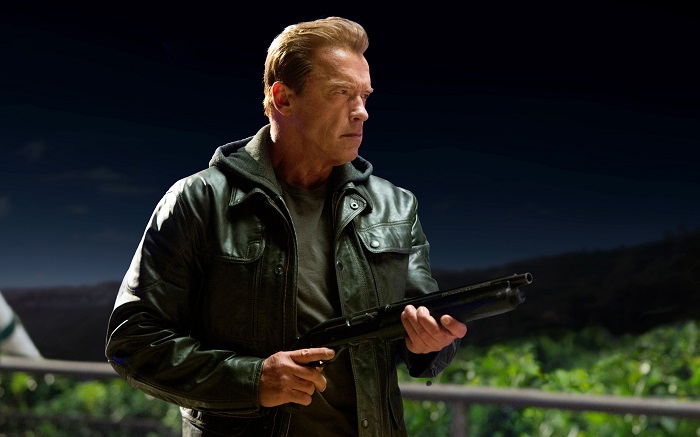

Terminator Genisys tries to convince you that it's a smarter summer blockbuster than, oh, say, Jurassic World. While the latter proudly trumpets its "turn your brain off and enjoy the dinosaurs" mission statement, Genisys, at times, seems to want you to use your noggin' as it zips around various timelines, playfully toying with events we've seen occur in other Terminator films and pulling surprises on audience members who somehow avoided seeing any of the movie's spoilerrific trailers. But it's all a facade. Genisys sets up mysteries it never solves (so obnoxious) and steers all of its time-travel shenanigans toward a boring "let's infiltrate this building and destroy Skynet" climax that feels like it could have come from Terminator 3, 4, 7 or 15. Jurassic World box office be damned; since the super-charged success of Fury Road, things have taken a sharp downward turn when it comes to reviving old box-office icons this summer.
I don't mind Genisys' setup. After a short glimpse of the post nuclear-war future where machines rule the Earth, Kyle Reese (Jai Courtney) gets sent back in time to 1984 by human resistance leader John Connor (Jason Clarke) just as he did in James Cameron's original Terminator film. This is not a reboot or a re-imagining, but a new, in-continuity interpretation of the exact events from the first movie. Just like before, John goes back to track down Sarah Connor (Emilia Clarke), John's mom, and protect her from the killer cyborg (Arnold Schwarzenegger, de-aged by computer graphics to look just as he did in '84) that was sent to kill her. Except — surprise! — when Reese arrives in the past nothing is like it's supposed to be. Sarah isn't the mousy waitress he'd been expecting to find but something closer to T2's badass version of the character. And the killer cyborg has already been dealt with by Sarah and yet another T-800 model (Schwartzenegger again, but this time looking as he does now) that was sent back by … someone … years ago to protect her as a child. Oh, and there's a T-1000 (the liquid metal kind from T2) running loose trying to kill everybody. The timeline is a wreck and nobody really knows what's going on!
And that's all fine, but the problem is, by the end of the movie, still nobody really knows what's going on! Genisys uses this stuff as an interesting jumping off point — riffing on the original film in sort of the same way Back to the Future Part II did during its 1955 segments — but then never concerns itself with answering the very questions it poses. What mysterious individual sent back a friendly T-800 to protect child Sarah? We never find out! How did Skynet, the doomsday program that controls the machines in the future, get a T-1000 back to this point in the timeline? The movie doesn't bother explaining; it just wants you to remember how cool Robert Patrick was in T2.
And things get more problematic from there. Director Alan Taylor and writers Laeta Kalogridis & Patrick Lussier attempt to center their film on two relationships — the one between Sarah and the friendly terminator she calls "Pops" and the one between Sarah and the man she knows she's supposed to fall in love with so they can get cozy and conceive humanity's savior. Both fall extremely flat, with the script and the actors failing to move the emotional needle even a little. Clarke and Courtney have zero chemistry, and Schwarzenegger fails to revive that T2 magic as he mugs through a series of one-liners but brings little heart to the role.
Maybe the movie could have survived these failings if it did better on the action front, but it's a dud in that regard as well. Clarke is simply miscast as the hardened warrior version of Sarah, comparing miserably to not only O.G. Sarah Linda Hamilton but also her fellow Game of Thrones cast member Lena Headey, who essayed the character so wonderfully on the underrated Terminator: The Sarah Connor Chronicles TV show. Courtney is bland as always. Their characters are given a series of bad guys to contend with: the original T-800, the T-1000 and then ultimately a time-traveling John Connor, who Skynet has turned into a new kind of Terminator — one that's a mixture of human and machine (and pretty much what I turned the entire human race into at the end of Mass Effect 3, BTW). Jason Clarke is solid in the role, and I like the design work on him once his human flesh has given away to the robotic, nanobot muscle underneath. But his battles against Pops and Kyle are never elevated to anything special. Whereas Terminator 2 raised the bar on FX-driven action spectacle, this one just awkwardly limbos under it, piling on chase scenes that turn monotonous before the movie even reaches its halfway point.
Two other annoying things of note: Terminator Genisys commits the cardinal sin of wasting the great J.K. Simmons, giving him the most superfluous role by a famous actor you'll see this summer. Additionally, the movie has the most aggravating mid-credits stinger in recent memory. Instead of teasing future revelations or new plot developments, the stinger merely undoes everything the heroes accomplished during the course of the movie, rendering the whole affair moot. Yet another example of a studio blatantly trying to copy Marvel without completely understanding why their films work so well.
Ultimately, much like with Jurassic Park, we should all probably admit that The Terminator was a pretty perfect self-contained story that maybe never needed to be sequelized in the first place. Yeah, thanks to the genius of James Cameron and his clever idea to flip Arnold from bad to good in that second film, we got a follow-up that didn't suck with T2. And, again, I counted myself as a Sarah Connor Chronicles supporter. But this franchise just doesn't have the components to support the type of elongated ongoing movie franchise that every studio wants to make these days. Reportedly, Paramount and Skydance want Genisys to be the first of a new trilogy, but how many times can we watch a new model of terminator try to kill Sarah Connor? How many times can we sit through a watered-down PG-13 version of Cameron's original vision that seems more interested in saving up revelations for future sequels than it does telling a satisfying self-contained story?
I can tell you my answer: No more times.











